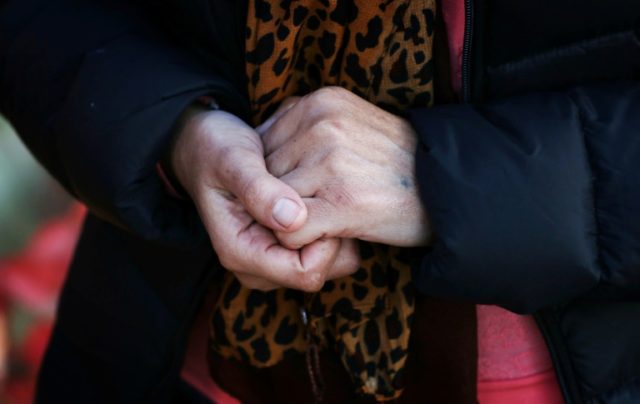A 28-year-old Yazidi former sex slave named Shatha Salim Bashar is scheduled to testify in German court next month against one of the fourteen Islamic State jihadis who allegedly enslaved and raped her, used her as a human shield, and forced her to watch her best friend die.
The defendant in the case is a German national who became one of the many European residents to migrate to the Islamic State and become soldiers for its now-fallen “caliphate” in Iraq and Syria. Shatha was abducted from her village on Iraq’s Sinjar Mountain in 2014 and spent over three years as a slave.
The semi-autonomous Kurdistan Regional Government (KRG) of Iraq created an Office of Kidnapped Affairs to rescue Yazidis and reunite them with their families. The Yazidis are a small religious minority of Kurdish extraction often persecuted by fundamentalist Muslims who view their unusual faith as devil worship.
According to the KRG, 360,000 of the estimated 550,000 Yazidis left in Iraq are currently living as refugees or otherwise displaced from their homes. The Office of Kidnapped Affairs gave some grim statistics to Fox News:
At least 1,293 Yazidis were killed on August 3 and over the following few days at the beginning of the ISIS invasion. A total of 6,417 Yazidi were kidnapped at that time – 3,548 females and 2,869 males. Some 3509 Yazidis are documented as having survived the ordeal: 1192 women, 337 men, 1033 girls, and 947 boys. Chillingly, 2,908 Yazidis are deemed still missing – 1323 females and 1585 males.
The number of orphans produced by the invasion stands at 2,745 and the number of Yazidis who have emigrated out of Iraq, their ancestral homeland, is documented to be more than 100,000.
Moreover, 80 mass graves have been discovered in the Sinjar region, and the Islamic terrorist outfit blitzed 68 of their religious temples throughout the four-year war.
Shatha’s harrowing story is all too typical of the Yazidis victimized by ISIS, which might very well have wiped them out if left to its dark devices:
She was kidnapped alongside her mother, her sister, and two younger brothers. In the beginning, she pretended to be the mother of her youngest brother, aged just 3 – in the hopes she would be spared violation if ISIS militants believed she was not a virgin.
But Shatha was violated by every one of her 14 enslavers. Moreover, the tiny young woman was used as a human shield by ISIS, thrust onto the frontlines in Syria and forced to watch her best Yazidi friend die on the battlefield. Her reunification months later should have been one of jubilation – but her friend’s family also arrived with smiles, thinking the women were rescued together. Shatha was the one to break the shattering news.
The fate of young Yazidi men captured by ISIS was no better, as they were brainwashed and tortured into joining the terror state’s “Cubs of the Caliphate” child soldier force, as was the case with Shatha’s two brothers.
The Kurdish government believes some of the ISIS fighters held prisoner in Iraq could be brainwashed Yazidis who will never be returned to their families if they are inadvertently “repatriated” to foreign companies.
At the moment, Yazidis rescued from ISIS do not always have homes to return to, because a huge portion of their population is living in decaying refugee camps, as Shatha does. Some of the former ISIS slaves need extensive deprogramming and could still be dangerously loyal to their onetime captors. Yazidis who return home could still be attacked by ISIS remnants or other militant groups.
Some Yazidis have returned home only to find the brutal Islamic State burned their farmland, looted their houses, stole their crops, and destroyed their farm equipment. For good measure, ISIS left Yazidi territory strewn with land mines.
Many Yazidis say they are afraid to return home until the minefields are cleared, basic security is established, infrastructure is restored, and adequate supplies are provided by the Iraqi government for the difficult task of rebuilding their ravaged villages.
Sympathetic Iraqi officials worry that discrimination against the Yazidis will prevent them from getting what they need, especially since one of their most urgent requirements is fertilizer, and fertilizer is tightly controlled because it can be used to make explosives.
Among the most painful issues to resolve is the disposition of babies with ISIS fathers borne by the Yazidi women they raped. There are only believed to be a few hundred of these babies alive, but they are uncomfortably trapped between Yazidi tradition (which does not allow converts or marriage outside the religion) and the Iraqi legal system, which seems determined to classify the babies as Muslim.
A group of Yazidi journalists met with Rep. Jeff Fortenberry (R-NE) on Wednesday to discuss the horrors of ISIS occupation and “the bitter reality that we are living in,” as one of the visitors put it.
Fortenberry’s constituency in Nebraska includes the largest groups of Yazidis living in the United States, and he was instrumental in getting the State Department to classify the Islamic State’s actions against Iraqi Yazidis as genocide.
“In the past, when our grandparents or great-grandparents, they were telling us that the Yazidis had been in the past subjected to genocide, but we couldn’t believe it, we couldn’t understand it because there was nothing written, nothing documented,” one of the Yazidi journalists said at the meeting, emphasizing the importance of documenting the ISIS atrocities and giving testimony for the record as Shatha Salim Bashar intends to do.
“You as journalists have to continue to tell this story. It’s easy for the world to forget, to move on,” Fortenberry told his guests.

COMMENTS
Please let us know if you're having issues with commenting.